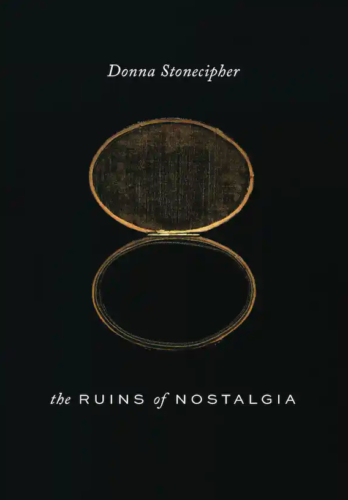If nostalgia is primarily aesthetic, i.e., if a beautiful moment we experienced but were not able to apprehend could be apprehended post-hoc, then the impossibility of living in the present could be slathered over with a layer of gold-suffused salve, SALVE, as the blue-and-white tiles spelled out before the door to the barber shop in the city of our youth, for which we feel nostalgic. Repeat. The barber is dead; long live the barber. The city of our youth no longer exists; it exists in our minds. The barber’s pinup calendars are smoldering their way down the landfill. Johannes Hofer believed that nostalgia could be cured with opium, leeches, or a trip to the Alps, but we know that the only cure for nostalgia is nostalgia. There is an illness informing the illness, and that illness must be mined to extract the exquisitely atavistic elixir. We kept walking through the beautiful city in our minds saying, Stay, thou art so fair, but the city did not comply. We walked and walked through the city in our minds infecting and healing ourselves at the same time, infecting and healing, infecting and healing, until it was impossible to tell the difference, until we were totally infected, and totally healed. But as soon as we left the city in our minds to come back to this city, we knew that the healing was temporary, and the infection forever. * If nostalgia is primarily aesthetic, then it is also unstable, and if we get attached to beautiful images today, we might spurn them tomorrow. We might love the beautiful images because we can’t apprehend them, “the beautiful” always relocating itself, unrecognizable as the city outside, which is why we keep trying to rebuild the city in our minds. And it’s why we slather salve over SALVE, suffuse it, why we gold-leaf gold leaf. It’s why we ruin the ruins of nostalgia.
The Ruins of Nostalgia 15
Feature Date
- February 13, 2024
Series
- Editor's Choice
Selected By
- Eric Pankey
Share This Poem
Print This Poem
“The Ruins Of Nostalgia 15” from THE RUINS OF NOSTALGIA: by Donna Stonecipher.
Published by Wesleyan University Press on October 10, 2023.
Copyright © 2023 by Donna Stonecipher.
All rights reserved.
Reproduced by Poetry Daily with permission.

John Nijenhuis
Donna Stonecipher is a poet and translator with an MFA from the Iowa Writers’ Workshop. She is the author of seven books of poetry including Ruins of Nostalgia, The Reservoir, The Cosmopolitan, Model City and Transaction Histories which the New York Times named a top ten collection of 2018. Her poems have been published in many journals, including The Paris Review. In 2018 she won a year-long writing grant from the Berlin Senate. She translates from German, and her translation of Austrian poet Friederike Mayrocker’s etudes, for which she received a National Endowment for the Arts Fellowship appeared in 2020. She lives in Berlin.

Middletown, Connecticut
"This deeply intelligent book is a work of emotional and intellectual archeology revealing the changes wrought on two cities by the not-so-invisible hand of the market. Reading it, we see a bit of what Benjamin's Angel of History must see as he is blown backwards into the future."
—Rae Armantrout, author of Finalists
"'The Ruins of Nostalgia': a spur, a goad, a refrain, an environment, a mode of critique and homage. Stonecipher offers here both a hauntology and a melancholy celebration. This is also a sly and funny book, a brilliant new chapter in her distinctive, resonant lyrico-critical project. Stonecipher is the most compelling and transformative writer of the contemporary prose poem in English. Anecdote, vignette, ekphrasis, earworm, micro-essay, satire, incantation, griefwork: all here. This book cements Stonecipher's singular status as a poetic archaeologist and chronicler of our modernity."
—Maureen N. McLane, author of My Poets
"Most of us will reach a certain point in our living where if we can't figure out how and where to place our nostalgia it will completely overwhelm us. Donna Stonecipher's masterful solution is to build reflexive spaces for our memories, for what we've lost or what's been destroyed, for what's been so altered it's unrecognizable. She softens the blow of time and change by finding a way to tell all our stories at once, by compressing the nearly unbearable presence of our ruins into exquisitely sculpted prose passages and thinking architectures that radiate intelligence, charm, and mercuriality. This is a book I want to always be reading."
—Renee Gladman, author of One Long Black Sentence
"Stonecipher is a master of the prose poem, a hybrid form that, in the words of literary scholar Jeremy Noel-Tod, 'drives the reading mind beyond the city limits'... Stonecipher takes the idea of nostalgia, which originally meant a kind of homesickness, and examines it with irony and earnestness."
—Unknown Reviewer, Exberliner
Poetry Daily Depends on You
With your support, we make reading the best contemporary poetry a treasured daily experience. Consider a contribution today.



